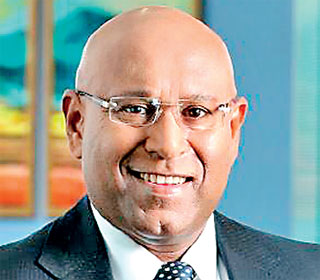Saturday Feb 21, 2026
Saturday Feb 21, 2026
Saturday, 14 May 2022 01:17 - - {{hitsCtrl.values.hits}}
 |
| NDB Chairman Eshana De Silva |
 |
| NDB Director/CEO Dimantha Seneviratne
|
National Development Bank PLC yesterday released its financial results for the first quarter ended 31 March, a period that was undoubtedly a most challenging one.
Director/CEO Dimantha Seneviratne in a statement said that the repository of experience the bank has gathered through the four decades of its presence, its diversified loan portfolio and strong customer relationships built over the years have enabled the bank to navigate through the current challenges.
“We delivered on our banking revenue targets, which saw a YoY growth of 22% compared to 2021, but we had to book in significantly higher impairment charges and losses on the lending and investment portfolios due to the challenged macro-economic conditions, impact arising from the significant rupee depreciation and significant interest rate hikes.
“This impairment build-up in turn, moderated our profits for the period under review. As a responsible financier, we continue to proactively recalibrate our efforts to provide relevant support to all our stakeholders, help build national economic resilience and propel expedited economic recovery,” Seneviratne added.
Analysis of financial performance – income, expenses and profitability
Gross income for the three months period under review ended 31 March 2022 (Q1 2022) performed satisfactorily – Rs. 19.2 billion, a 22% growth over the comparative period in 2021 (YoY growth). Core income sources of net interest income and net fee and commission income both performed well, propelling overall income.
Net interest income was Rs. 6.2 billion, a YoY increase of 21%. The upward trend in market interest rates following a tightening monetary policy adopted by the Central Bank of Sri Lanka pushed interest income and interest expenses both up.
The bank’s focused asset and liability management initiatives and timely re-pricing of the bank’s loans as well as deposits book in close tandem with market rates helped manage fund based income and expenses. Resultantly, net interest margin improved to 3.43% in Q1 2022 from 3.25% as of end 2021.
However, the bank recorded an impairment charge of Rs. 6.4 billion for Q1 2022 on loans and on the bank’s investment portfolio, which was a sharp increase of 192% over the comparative period.
The recorded impairment charge included a significant impairment provision made for foreign currency denominated government securities, factoring in the revisions of the sovereign rating of the country and the impact arising from rupee depreciation.
The impairment charge for the loan book is a reflection of the escalated stress levels faced by the customers in the current challenged economic conditions and significant impact arising from the rupee depreciation.
This charge comprised impairment charges on an individually significant basis as well as on a collective portfolio level basis, using objective evidence of customer credit quality. The resultant ratios indicating impairment levels; Impaired Loans (Stage 3) Ratio and Impairment (Stage 3) to Stage 3 Loans Ratio were 4.40% (2021: 4.55%) and 34.02% (2021: 32.81%) respectively.
On operating expenses, the same for the period under review was Rs. 2.7 billion. The bank’s cost management strategies and vast benefits derived from automation of internal processes and digitisation of customer solutions enabled the bank to manage the operating expenses increase at 6%, amidst high inflation.
Denoting a period of challenge, bank pre-tax profitability moderated at Rs. 962 million, a reduction of 72% over the comparative period, affected by higher impairment charges as explained above, whilst post-tax profitability reached Rs. 605 million.
Balance Sheet performance
Total assets of the bank reached Rs. 765 billion by end-March 2022, a 9% increase over December 2021 position. The increase in the Total Assets includes the exchange rate impact arising from the sharp depreciation of the rupee during the period under review.
Gross loans closed at Rs. 580 billion, an increase of 10% translating to a quantum of Rs. 54 billion. Loan book growth after excluding the effects of the exchange rate movement stemmed from all business segments. The dynamism of the bank’s Balance Sheet, particularly the sound diversification of the loan book has ensured the bank’s resilience in turbulent times.
The Balance Sheet remained adequately capitalised through an optimum composition of shareholder equity, customer deposits and borrowings. Total shareholder equity stood at Rs. 55.4 billion, having been strengthened by a Tier I equity capital infusion of Rs. 9.5 billion in 2021.
The bank also raised Rs. 8.0 billion via Basel III compliant Tier II debentures in the latter part of 2021, the timing of which helped the bank optimise its cost of funds. Customer deposits reached Rs. 600 billion, with a YTD increase of 9%. CASA composition continued to improve, with the ratio reported at 28% by end Q1 2022.
Investor and regulatory ratios
Return on average equity and earnings per share were 7.80% and Rs. 12.48 respectively. Pre-tax Return on Average Assets was 0.96%. Regulatory ratios of Liquidity Coverage Ratio (Rupee), Liquidity Coverage Ratio (All Currency) and Net stable Funding Ratio stood well above the regulatory minimum requirement of 100% at 206.32%, 156.73% and 118.43% respectively.
Tier I and Total Capital Adequacy ratios as of end Q1 2022 were 8.69% and 13.36%, ahead of the regulatory minimum levels of 8.00% and 12.00% respectively. Net asset value per share as at end Q1 2022 was Rs. 155.06 (2021: Rs. 165.02).
Outlook
Sri Lanka is going through a phase marked by acute socio-economic hardships. Policy direction is clear at this juncture, where a tightening monetary policy will be adopted, with interest rates to be high, in a bid to preserve rupee stability and ensure enhanced foreign exchange reserves.
The road ahead for the country will be steep, but there is hope for the opportunities and potential that lie ahead, which will be best executed with political stability established sooner than later. As a financial services group of companies engaged in both banking and capital market services, NDB is geared to extend its support to the national economic revival.
The Group is expected to maximise on the synergies in balancing and bolstering its performance with a bid to preserve stakeholder returns. NDB’s financial services as well as advisory services, together with flagship initiatives such as NDB Jayagamu Sri Lanka, Sri Lanka Vanithabhimana, etc., will ensure all segments of the economy are reached out with needed support. The bank’s performance was recently endorsed by Global Finance USA in naming NDB as the Best Bank in Sri Lanka for 2022.